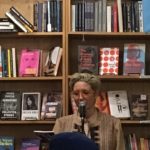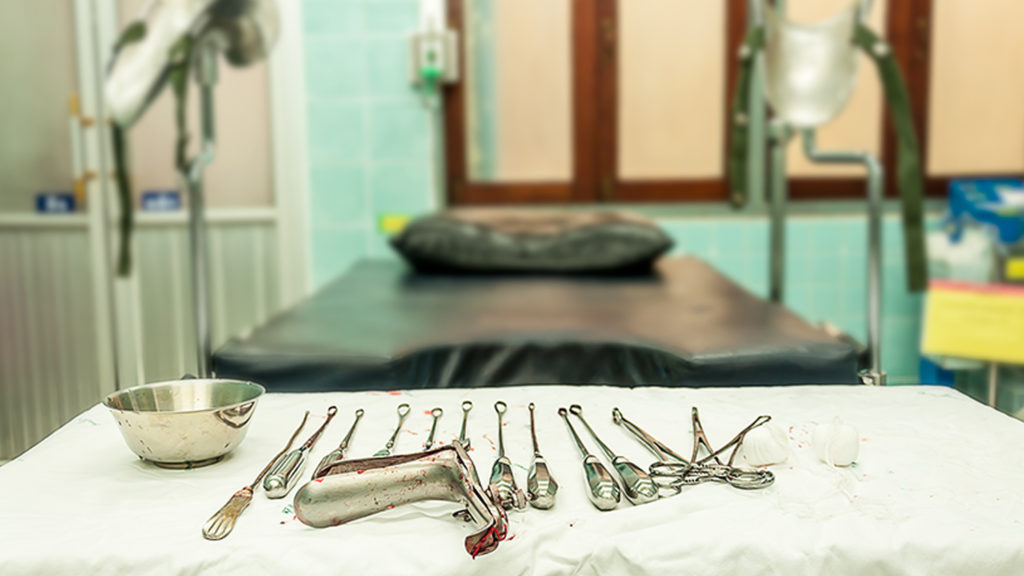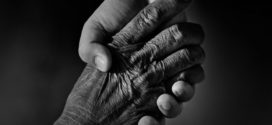1997-2017:: in which I am a dystopia
As the unexamined traumas lodged in my muscles, bones, and organs metastasize into a laundry list of erratic pain, illness, and life-altering shifts, I find myself in one waiting room after another, filling out the same information (and lack thereof): what are your current symptoms? how long have you been experiencing these symptoms? check the boxes below to indicate what symptoms you have had in the past six months. do you experience [x] always? regularly? sometimes? occasionally? never? Putting myself into boxes.
There isn’t one for “non-binary,” so—at least in these past few years, as I rebuild myself from the lint in my pockets—I make a third box next to “male” and “female” and check that. Sometimes I write, “n/a.” Usually, though, by the time there’s an “official” record, I can see myself in the clinical erasures of the chart: FEMALE.
They usually ignore the fact that I sometimes write “alchemist” as my occupation, when I’m testing the waters to see if they’re paying attention. No one mentions it, but then again no one seems to read what I say in these forms, the long multi-page intake I pore over from psych offices, neurologists and heart specialists alike followed by the inevitable, “So, what brings you here today?” in tones from rushed to bored.
Because I’ve spent my life in a female human body, though, hospital and doctor visits include di riguer doubts of my ability to fully comprehend my “feelings,” general disregard for my intelligence, and are you sure you aren’t pregnant repeated by anyone who opens your file. Even when I tell them, “not possible, sex is too painful, I haven’t had it for _________ months”, or “I’m not having sex with men right now,” they insist on a pregnancy test, but not in a way that says I believe you, and respect your ability to know and tell your story but we are required by law to do this anyway. No—this (both the procedure and the behavior) is standard issue. Your story doesn’t click with the insurance protocols. Your words don’t ping on the optimized search of tags to which you can be assigned, so they fade into oblivion.
You are a body capable of heteronormal reproduction. You are your reproductive history, your organs, and the official version of their intended use.
The forms I ride in on require of me questions cis-men breeze right over: Total number of pregnancies? _________ and then: Miscarriages? Elective terminations?
Total number of pregnancies: two.
Elective terminations: one.
Elective terminations? The not so subtle rewording, the choice inherent. The silent judgment.
The not so silent judgment that follows, the hmm, the aha, the “I see you’ve had an abortion, when was that exactly?”
June 1997:: in which I am a statistic
I am eighteen years old and I am graduating high school today. This everyone knows.
This is the story of this day that goes into photo albums and narratives, in the official account of what and who I “am”, what “kind” of “girl” I “am.”
I am also pregnant. No one knows. This, and how I got here, is the story that goes into my cells and my organs, shame-stricken from the record. This, like so many other inadmissible parts of me, gets buried deep in my underground. I won’t speak of it for decades to anyone I know—just to the strangers collecting the forms where the “termination” box will appear, for all future years of my life.
It is 1997 and with every bit of my being, I have been waiting to leave, to become, to exhale, for as long as I can remember.
For now, but not for long, I live in Brooklyn, with my mother, in what is still, then, a working-class Italian enclave of Williamsburg in New York City. I have been working since I was 12 years old.
When I leave, I will never again live in this house. I have nightmares about being forced to move back there for the next two decades.
I am eighteen years old, and I have been offered admission to ten of the most selective colleges in the country, and because of need-blind admissions policies I am headed to Swarthmore College in Pennsylvania in the Fall, on a nearly full scholarship, a combination of a need-based grant, loans, and work-study, which I will start immediately upon my arrival.
I go to a school that doesn’t rank, so there’s no “top of my class” to graduate in, but I’ve put every ounce of my energy into getting good grades, working, and doing extracurricular activities for years in the belief that this can turn straw into gold, that my future and that of my family will be one that I can change. It is up to me. Everything, I’ve been told many times, has been sacrificed for me, so I am expected to make others’ choices worth it. I equate love with accomplishment, my own value with the conditional waves of anger, the disgrace that accompanies any deviation from this path.
I am eighteen years old and I am graduating high school and later I won’t remember what I wore, or much else about these days, the details have fallen into one of the many wormholes of the excised history of the traumatized mind.
I am graduating high school, and tomorrow I have an appointment at Planned Parenthood for my termination. I am smiling for photos, I am talking about summer plans (my job, their vacations), I am going bowling afterward.
No one knows. My boyfriend, who lives in Manhattan and whose parents are divorced, well off, psychoanalysts, somewhat absent but generous, is paying for it.
I make my appointment in the morning. I plan to go to work in the afternoon, refusing in advance any future pain or difficulty—or deeming myself unworthy of taking time off to mourn or heal.
There are no mourning or healing conversations. Not with myself, and not with anyone.
There is just shame, just something that must stay hidden because I am going to change my story because I am the vessel of family hope and expectation and I will make good on the investments made on my behalf because I am not that kind of girl.
No one knows.
In the old-school medical offices on second avenue, under the glare of the fluorescent lights, willing myself to the logical mind that is my place of safety, out of my body as usual, I am waiting for my turn, ignoring being cold, staring at the drop ceiling tiles on a stiff table in a too-thin gown.
The woman to my right, a blowsy blonde with a smokers’ rough voice asks me if it’s my first, tells me it’s no big deal and that she’s here for the fourth or fifth time, she can’t remember. She has all the tells that later life would’ve recognized as many years of opiate dependency, likely methadone—but I don’t know that yet. However, it’s the 1990’s and the corridor of east-village-to-union-square still teems with clinics and addicts, littered with syringes and their colorful adapters.
But I’m not yet at the cool logic of the systemic analysis of her story, those conditions and agents I will burrow farther and farther into as scholarship offers a gateway away from this body.
I am 18 and though I am desperately seeking footholds in my brain that make me not on fire her words rip through me like a sudden storm and I am sick, unable to account for her nonchalance.
Mine is feigned, entrained with great care by the practiced survival instinct that has long told me that my body and its eruptions—physical and emotional—are to be repressed, ignored, feared, or ashamed of. I am 18 and I am a child that often didn’t get to be a child and I am terrified out of my mind and I am scared that something will happen and I’ll never be able to have a baby and I am scared that something will go wrong and I have come to the clinic alone (I insisted) and the doctors cold hands and scoot down and put your feet in the stirrups and more staring at the ceiling and intense analysis of the textures of the tiles and I am drinking a plastic container of concentrated apple juice with a peel off foil top and a saltine and it feels like they took a vacuum that ripped my insides out and they give me a giant diaper-like sanitary napkin that says without saying that this bleeding body is Other, this blue and white clinical sponge a solution to problem, to me and my mistake. There is a forgotten conversation in a neutral, dingy room about options, numbly nodded through, before this all happens, but there is no direction but forward, following the line that started before this bump in the road, which I plan to get back on as soon as I walk out the door, locking these hours in a box, not to be opened or mentioned.
2017-2018:: in which I am a volcano
In volcanic eruptions, I read, magma rises through cracks or weaknesses in the Earth’s crust. When the pressure is released, eg as a result of plate movement, magma explodes to the surface causing a volcanic eruption. The lava from the eruption cools to form new crust.
The rock builds up, and a volcano forms.
It’s hard to locate the origin of shame in my body. No, that’s not exactly true—it’s more that: it’s hard to locate the entry point in the story. I have vague, dreamlike memories of not feeling ashamed, embarrassed, or uncomfortable in my body, but it is so early that I can’t identify the precise shift, but I know that by 8 years old, it was going strong.
When do we start telling human children we call “girls” that they can’t sit with their legs spread, that their shirts can’t hang down below their nipples when they turn upside down on the monkey bars? When do those children learn that their value is inextricably linked to their ability to be attractive to the opposite sex—to their body’s ability to do so?
For those of us with nothing in our pockets, fighting against abuse, or eking out survival, this lesson has an additional set of teeth—the ability to attract and manipulate sexual attention becomes a capital negotiation, a cost-benefit analysis.
I grew up in a household that looked from the outside like a “liberal” one, but where conservative, sex-negative body shaming was the norm. As a preteen I was dragged out of sex-ed classes (“human education,” they called it) where my school was using “Our Bodies Ourselves,” and told by my mother that my school was being irresponsible, as she went on a vocal campaign to recommend the adoption of an abstinence-only text, that no other parents (bravo!) went along with. So, only I was removed from these classes.
My friends were jealous, they said it was a drag, and I got to work on homework in a study hall, which was generally considered the better deal. But I was mortified—both because my experience in school was already that of IMPOSTER OTHER DIFFERENT and all I wanted was to seamlessly fit into a normal experience.
I wanted desperately to be liked and accepted, and from first or second grade conversations with other little “girls” (I use quotes because there was no option to be other than your cis-gendered origin) were already concerned with which boys we liked, and with stories of teenage romance, boyfriends, and the role of the body and clothes in this.
I also wanted to understand and feel legitimized in my instincts that body exploration was not evil and degenerate and that my quickly growing body was not something to hide. In fifth grade, I was the tallest person in my class, and the first bra I ever bought was a C cup. As my breasts had grown, my mother shifted all my clothes into tent-like sizes and insisted my bras be matronly, taupe and white devices with the intent of taming and obscuring my breasts. Any desire for color or pattern or pretty was a place for shame: why was I thinking about who was going to see my bra? SLUT! Touching myself was verboten. Wanting contact or sex was verboten. Early experimentation, written down in a secret diary read without my permission, resulted in repeat visits to a priest for repentance and retraining in classic Catholic shame, fire, and brimstone. Not only was I dirty, low, broken, I was a sinner, I would be punished not only in this world but beyond.
There is no boundary where shame “about the body” or about self-ends and shame “about abortion” begins. For me, it is inextricably entwined. Its roots come in a deeply seeded fear of my own, true self, my desires, being something to be repressed and hidden, and the learned belief, repeated to me so many times by my mother, that left to my own devices, I would be a disaster.
My abortion, inescapable, on the timeline of my life like a toxic waste spill, was a beacon of this inner programming for nearly twenty years. It was true, the inner voice said, left to your own devices you fuck everything up. You become a statistic.
The thoughts are woven tightly with these aligned with my mother’s perspective, the gaslighting that was so constant in my days that came to live in my head, a voice I came to misunderstand as my own inner voice, rather than a programmed recording I hadn’t been able to dub over. I didn’t know this was even an option. Any time I couldn’t get a job, struggled with a class, was unsure of my next steps, the abortion appeared like a warning flare—reminding me of my weakness, my lack.
For nearly twenty years, the abortion loomed, as illness and broken relationships and labor precarity and a string of traumas each as damaging as the next made child-bearing a seem a diminishing possibility. With each misstep, I thought to myself, you killed the only child you will ever conceive. As my reproductive system remained riddled with pain and cysts and in need of surgery then medication for many years the words in my head weren’t was there a medical problem with the abortion or could there be a metaphysical, psychological root of this illness, but only, ever, you fuck up you ruined your chances at children, my shame rooted in my feelings of weakness and inadequacy, of self-blame. I was told again and again, in doctor’s offices where the “termination” was discussed, that I was a ticking clock. My womb was broken, and my promiscuity was often inferred as the probable cause. Endometriosis being rarely identified the going theory was, usually, unchecked STD’s. Judging YOUR FAULT faces, judging YOUR FAULT official diagnosis.
And: no one talked about it. I didn’t know a single woman who’d come forward about an abortion until we were much older. No doctors understood—few doctors do—the manifestation of trauma in the body as chronic illness. It took until the magma collecting under my surface, building, and building, eventually erupted, and I ended up in countless hospitals and emergency rooms, nearly twenty years later.
It was only as I worked my way out of trauma that I realized the source of my programming, and started to reclaim my story, and see that my shame was learned—it was not mine. There is no shame in these stories. If we can find a safe, supportive container for their release (and if we create these soft landings for each other) we can begin to truly heal. And when we begin to release the chokehold of other people’s shame from our bodies—that’s when the shift begins. It is as though I barely recognize myself, stripped of this burden I called by my name for so long.
I am building my body anew, and these stories, too, become the foundation. The lava hardens, and becomes the landscape — and even on that burnt landscape, new growth appears.
**********************************************************************************************************************************

Lynne DeSilva-Johnson (they/them) is a non-binary queer interdisciplinary creator, cultural scholar, and educator.
Lynne is the founder and creative director of The Operating System, a radical open-source arts organization, online platform, and publisher. They are a visiting assistant professor at Pratt Institute. Previously, Lynne served as an adjunct in the CUNY system for 10 years, as well as a teaching artist for myriad organizations and schools, working in classrooms with K-12 through adult learners.
Alongside this work in the education sector, Lynne has worked for two decades to help build programming, curriculum, publications, design, identity, and infrastructure for local nonprofits as well as independent arts and education oriented small businesses. They are an independent curator and host of a wide range of exhibitions, panels, performances, and workshops, collaborating with a wide range of practitioners, organizations, and venues.
Recent publication credits and interviews include Wave Composition, The Conversant, The Philadelphia Supplement, Gorgon Poetics, POSTblank, Vintage Magazine, Live Mag, Coldfront, the Brooklyn Poets Anthology, Resist Much/Obey Little: Poems for The Resistance, and “In Memory of Feasible Grace,” part of the Panthalassa Pamphlet series, among others. Their performances and work have appeared widely, including recent features or projects at Spoonbill Books, Open Source Gallery, Artists Space, Bowery Arts and Science, The NYC Poetry Festival, Parkside Lounge, Carmine Street Metrics, Eyebeam, LaMaMa, Happy Lucky No.1, Triangle Quarterly, Undercurrent Projects, Mellow Pages, The New York Public Library, Launchpad BK, Dixon Place, Poets Settlement, SOHO20 Gallery and many more.
Current projects include a hybrid poetics/research project around evolving system ecologies, the Building Interpersonal Infrastructures series, and a multimedia text-performance project around the somatic manifestations of trauma.
They are always still beginning.
 Wendy Angulo Productions
Wendy Angulo Productions







